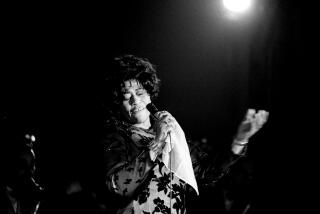Other Side of Fitzgerald
- Share via
An artist’s life is often filled with struggle and pain and etched in tragedy. In the case of novelist F. Scott Fitzgerald, during the last year of his life he made only $13 and change in royalties. He felt he was a failure. In a letter to his wife Zelda he wrote: “My God, I am a forgotten man.” And when he died in 1940, only a handful of people attended his funeral.
The recognition Fitzgerald desired ultimately occurred after his death of a heart attack at the age of 44. His five novels--”This Side of Paradise,” “The Beautiful and the Damned,” “The Great Gatsby,” “Tender Is the Night” and “The Last Tycoon”--have sold more than 10 million copies worldwide.
Fitzgerald’s turbulent, tragic life is explored in the new “American Masters” documentary, “F. Scott Fitzgerald: Winter Dreams,” premiering Sunday on PBS. Directed by Oscar-winning filmmaker DeWitt Sage, “Winter Dreams” explores the writer’s life and literature through his own words. The literary biography features excerpts from private letters and scrapbooks, photos from family albums, interviews with Fitzgerald’s friends, scholars and novelist E.L. Doctorow. Amy Irving reads excerpts from Fitzgerald’s novels and short stories; Campbell Scott provides Fitzgerald’s voice and Laura Linney is the voice of his mentally disturbed wife, Zelda.
Susan Lacy, creator and executive producer of the “American Masters” series, had long wanted to do a film on Fitzgerald. “The thing most people know about Fitzgerald is that he was a drunk and he wrote ‘The Great Gatsby,’ ” Lacy says. “The truth is that he was an incredibly serious writer. He wrote every day he got up. I think his lifestyle in a way in the public mind overshadowed his recognition as a really important writer. We wanted to bring that to the fore.”
“For all of his lack of confidence and his mortification over his behavior while he was drunk, one thing [Fitzgerald] knew about himself--he was a writer,” Sage adds. Fitzgerald’s work and life were about the American dream, Sage says. “He had a particular ear for the American dream,” he adds. “He just had his finger on the pulse. He also wrote about American class better than almost anyone. American class did exist and it does exist, but we don’t like to talk about it.”
In the case of Fitzgerald, he was attracted to the upper class, but was also able to see through it “objectively as an outsider,” Sage says. “He was both inside and outside at the same time. He wasn’t about glitz and glamour, but he happened to be attracted to that.”
Sage traveled around the country to visit every area Fitzgerald lived and worked from his birthplace in St. Paul to Hollywood where he spent the last years of his life working as a screenwriter and attempting to finish his final novel, “The Last Tycoon.”
From his various interviews with Fitzgerald’s friends, Sage discovered many interesting, untold aspects of the writer’s personality. “He was a showoff,” Sage says. “He was also quite flamboyant. If he walked into a room, you didn’t miss F. Scott Fitzgerald. The second thing is Scott loved the underdog in a situation. If you had a stammer or if you had a limp or you were just not making it, immediately he wanted to help.”
Though he was in dire straits financially and physically in Hollywood, he knew he had one more novel in him. His secretary, Frances Kroll Ring, discusses in the documentary that he wanted her to keep “The Last Tycoon” a secret from everyone.
“He wanted it to be completely separate from the movie system he was writing about,” Sage explains. “He was very worried that he could hurt himself at the studios if the studios thought he was writing about them. I happen to think it would have been his best written novel...his writing was getting better at the end [of his life]. It was much tighter.”
Sage finds Fitzgerald’s story oddly optimistic. “He contradicted his belief there are no second acts in life,” Sage says. “There was a huge second act in his life--the recognition he desperately wanted and the financial security he desperately craved happened. I think Scott would be the first to understand the irony of it and then he would write about it.”
*
“American Masters: F. Scott Fitzgerald: Winter Dreams” can be seen Sunday at 9 p.m. on KCET.
More to Read
Sign up for our Book Club newsletter
Get the latest news, events and more from the Los Angeles Times Book Club, and help us get L.A. reading and talking.
You may occasionally receive promotional content from the Los Angeles Times.











